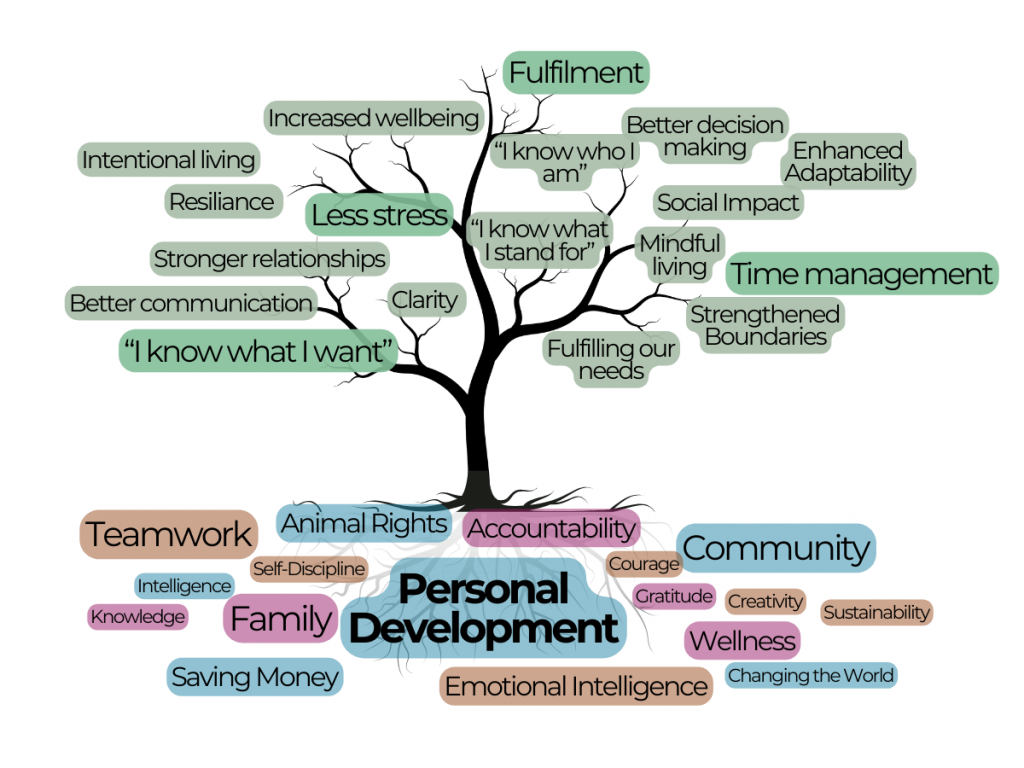In a world brimming with buzzwords like authenticity and purpose, it’s easy to drown in the sea of rhetoric without a clear direction on how to live by them. Many of us find ourselves grappling with the challenge of aligning our day-to-day existence with our true selves, yearning for a sense of clarity and purpose.
Enter core values—the unsung heroes that serve as guiding principles to help with decision-making and direction in life. In this article, we’ll demystify what core values entail; from unveiling a comprehensive list of common core values to engaging exercises tailored to distil your internal compass.
By the end, armed with your newly unearthed personal compass, you’ll be equipped to infuse your life with meaning, passion, and purpose. Join us on this transformative journey towards living a more authentic and purposeful existence.
What are core values?

Core values express what we hold dear and central. When we consciously define them, they can represent a set of guiding principles that help inform decisions and actions, ultimately steering us towards what is important to us.
When confronted with life’s myriad choices, they act as a reliable way to understand which choice will lead towards or astray of our aspirations. Thus, they are akin to a personal code for living intentionally, mindfully and authentically.
For example, if someone’s core value is family, they will find the most fulfilment in spending time with their partner, family and children. Work might play a role in providing for the needs of people they hold dear. On the other hand, they might also feel frustration over having to take away time for work and they might turn down better offers if they would involve allocating away or disrupting their family.
However, if the core value would be building wealth and growing finances over family, this person would want to take the offers and would feel frustrated if family needs would hold them back from taking them. If they had to prioritize family due to obligation, they would likely grow resentful, causing a rapture in the relationships.
The satisfaction and fulfilment in both scenarios were closely linked with how well the decisions aligned with the individual’s core values. Furthermore, dissatisfaction, irritation and anger when making choices mean two values conflict, either internally or interpersonally, as was the case in the second example.
Having an understanding of what core values are present in decision-making, can help us better communicate our needs and improve our relationships, reduce stress and improve wellbeing, set better goals, improve our confidence and inadvertently lead to being aligned with our life purpose.
Core Values List
Here is the list of the most common core values:
Accountability
Adaptability
Adventure
Alone Time
Ambition
Animal Rights
Anti-Racism
Artistic Expression
Authenticity
Authority
Autonomy
Balance
Beauty
Career
Changing the World
Charity
Chasing Your Dreams
Citizenship
Clarity
Clear Communication
Commitment
Common sense
Community
Compassion
Competence
Confidence
Conformity
Connections with Others
Consciousness
Consistency
Continuous Learning
Control
Courage
Creativity
Credibility
Curiosity
Dedication to a Cause
Dignity
Discipline
Diversity
Emotional Intelligence
Empathy
Entertainment
Entrepreneurship
Environmental Protection
Equality
Ethical Living
Expressing your Feelings
Faith
Fame
Family
Fidelity
Financial Stability
Forgiveness
Free Time
Freedom
Friendship
Generosity
Giving People a Chance
Going with the Flow
Gratitude
Growth
Happiness
Hard work
Harmony
Having a Vision
Health and Fitness
Home
Honesty
Honour
Humanity
Humility
Humour
Independence
Inner Truth
Innovation
Integrity
Intelligence
Intuition
Justice
Kindness
Knowledge
Leadership
Learning From Mistakes
Liberty
Love
Loyalty
Making Progress
Material Abundance
Meaningful Work
Mindfulness
Open-Mindedness
Order
Passion
Patience
Peace
Personal Development
Pleasure
Popularity
Positive Impact
Pride in Your Work
Productivity
Professionalism
Profit
Prosperity
Protecting Others
Quality Time
Religion
Reputation
Resilience
Respect
Responsibility
Results-oriented
Risk Taking
Romance
Saving Money
Security
Self-Discipline
Self-love
Self-Respect
Sensitivity
Service to Others
Spirituality
Stability
Status
Success
Support
Sustainability
Teamwork
Tradition
Travel
Trust
Truth
Wealth
Wellness
Wisdom
Find your core values through admiration and disapproval

To better understand your core values, think of who you admire, what inspires you and when you feel most like yourself. It also helps to think of the other end e.g. who or what we disapprove of or when we feel dissatisfied or irritated. With the later examples, someone or something is going against your core values.
Questions you can ask yourself:
- Who do I admire? What admirable qualities do they possess? What behaviours and actions do I want to emulate?
- What inspires you to take action? When do I feel the need to take a stand for someone or something? What risks was I willing to take on to take a stand?
- When do you feel most like yourself? Who are you with? What feelings are present? What is going on? What activities are involved?
- Who or what do I disapprove of? What about this person or situation irritates me? What makes me dislike certain behaviours?
- When do I feel unforgiving or even vindictive? What activities or circumstances contribute to feelings of discomfort or irritation?
Following this, summarise the qualities you listed and ask yourself what about this is important to me? You should end with a list of 3-10 core values.
Find your core values through the exclusion of options
In this exercise, start by going through the list of core values provided above or you can download and print them out from here.
- Selection: Write down 10 core values that resonate with you and feel important in your life.
- First round of exclusion: Cross out five core values from your initial list. This step challenges you to prioritize and refine your selection.
- Second round of exclusion: Cross out two additional core values from the remaining five. This further narrows down your choices.
- Final core values: You should now have three core values which stand out as the most important to you.
- Reflection and explanation: Write an explanation of each of the core values as if you would explain them to an alien race who has no concept of the terms. Explain to them also how these core values manifest in your actions, behaviours, and decision-making.
Reflection and explanation can be a crucial part of finding out our core values because we take what they mean for granted. However, the same core value can mean very different things to different people. For example, stability for me might mean financial stability specifically whilst for someone else it might be more about having stability in their relationship. It can also refer to having order and routine.
By trying to explain your core values to an alien you will circumvent your assumptions as well as cultural and social background. By reflecting on actions, you will also see how in alignment with your core values your life is.
How do you live in alignment with your core values?
At this point, you should know 3-10 personal core values, what they mean to you personally, a vague understanding of what is more or less important to you and how aligned your way of living is with those.
Now that you know this comes the important part – using your newfound knowledge to start improving your life in small and meaningful ways.
To live in alignment, try to:
- Set a vision of what living in alignment with your core values looks like.
- Set goals and behaviours that align with your core values
- When making decisions, reflect on what core values are at play and what is the outcome most aligned with the vision you set for yourself or will satisfy you.
- Understand what core core values are competing in certain situations – internal or external.
- Sometimes, there is no perfect resolution and that is ok, acknowledge that you’ve done the best you could.

Understand the noise when making decisions
Living in alignment with your core values is not always easy due to distractions, conflicts, and competing core values. This is why it’s even more important to understand what usually pushes you away from living intentionally towards your desired vision.
If competing core values seem equally important, you might have to review them again. However, if you feel persistent dissatisfaction something larger might be at play.
Here are some tips for journaling to help you navigate the core value noise:
- Clearly outline the conflicting core values in the situation, both yours and those of others involved. Use concrete examples to illustrate the tension.
- Identify statements and behaviours that aligned with your core values and those that went against them. Reflect on your responses to each, considering the congruence with your core values.
- Gauge your satisfaction level after the situation. Acknowledge the emotions—whether satisfaction or dissatisfaction—and explore their roots.
- How satisfied or dissatisfied have you walked away from the situation?
- Envision what would have needed to happen for you to walk away more satisfied. This prompts consideration of potential adjustments in future scenarios.
- Based on the reflections, what do you need to do next? Outline some actionable steps for the future. Consider behaviours, communication strategies, or personal boundaries that align more closely with your core values.
Approaching conflicting core values with a structured reflection process allows for deeper self-understanding and empowers you to navigate future situations with increased alignment and satisfaction.
The takeaway

Core values are like your North Star, guiding you through life’s twists and turns. They are the principles that matter most to you and shape your decisions and actions. It’s like having a personal compass to stay true to yourself.
Figuring out your core values is a bit like detective work. You can trace them through admiration and disapproval. Think about who you look up to, what inspires you, and when you feel most authentic. Flip the coin and consider who or what you disapprove of and when you feel off-kilter. Those discomforts often signal a clash with your core values.
Another way to uncover your core values is through the exclusion of options. It’s like narrowing down your favourite ice cream flavours. Start with a list, cross out some, then some more, until you are left with your top picks. Then, reflect and explain these core values like you’re describing them to extraterrestrial visitors. It’s about breaking down assumptions and getting to the core of what matters.
Now, living in alignment with these core values is where the magic happens. Picture your ideal life, set goals that match, and, when faced with choices, consider what aligns with your vision. Sometimes, core values clash, and that’s okay. Acknowledge the effort and move forward.
But, there’s always a bit of noise—distractions, conflicts, competing core values. Journaling is your ally here. Outline the conflicting core values, identify actions in line with or against your core values, gauge your satisfaction, and envision a more aligned outcome. It’s like a personal debrief, helping you navigate the noise and stay on course.
So, armed with your core values, go out there and let them be the wind in your sails. You’re the captain, and these core values are your compass—steering you towards a life that truly resonates with who you are.
Ready to transform your life? Let’s conquer your challenges together! Message me now or snag your free introductory call. Your journey to unstoppable confidence and satisfaction starts now.
Also, find out more about intentional living and resolving internal conflicts.
Ready to transform your life? Let’s conquer your challenges together! Book your free introductory call or email me at contact@janjaport.com. Your journey to unstoppable confidence and satisfaction starts now.
